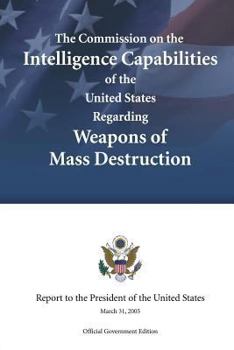The Commission on the Intelligence Capabilities of the United States Regarding Weapons of Mass Destruction
On the brink of war, and in front of the whole world, the United States government asserted that Saddam Hussein had reconstituted his nuclear weapons program, had biological weapons and mobile biological weapon production facilities, and had stockpiled and was producing chemical weapons. All of this was based on the assessments of the U.S. Intelligence Community; not one bit of it could be confirmed when the war was over. While the intelligence services of many other nations also thought that Iraq had weapons of mass destruction, it was the United States that put its credibility on the line, making this one of the most public-and most damaging-intelligence failures in recent American history. This failure was in large part the result of analytical shortcomings; intelligence analysts were too wedded to their assumptions about Saddam's intentions. But it was also a failure on the part of those who collect intelligence. In the end, those agencies collected precious little intelligence for the analysts, and much of what they did collect was either worthless or misleading. Finally, it was a failure to communicate effectively with policymakers; the Intelligence Community didn't adequately explain just how little good intelligence it had-or how much its assessments were driven by assumptions and inferences rather than concrete evidence. This report offers our conclusions on what needs to be done. We begin by describing the results of our case studies and the lessons they teach about the Intelligence Community's current capabilities and weaknesses. We then offer our recommendations for reform based upon those lessons. First, our main tasks were to find out how the Intelligence Community erred in Iraq and to recommend changes to avoid such errors in the future. We recommend substantial changes, and we believe deeply that such changes are necessary. Second, no matter how much we improve the Intelligence Community, weapons of mass destruction will continue to pose an enormous threat. Intelligence will always be imperfect and, as history persuades us, surprise can never be completely prevented. Finally, we emphasize two points about the scope of this Commission's charter. First, we were not asked to determine whether Saddam Hussein had weapons of mass destruction; our mission is to investigate the reasons why the Intelligence Community's pre-war assessments were so different from what the Iraq Survey Group found after the war. Second, we were not authorized to investigate how policymakers used the intelligence assessments they received from the Intelligence Community. This unclassified report is derived from classified report that was delivered to the President on March 31, 2005. We endeavored to write our classified report in a manner that allowed as much of its content as possible to be released in this unclassified report. Because our man-date required us to review, and reach conclusions from, some of the more sensitive information in the possession of the United States Government, there was some information that we simply could not release in our unclassified report. Where the unclassified report omits substantive information that appears in the classified report, we make reference to the omission and, where possible, offer a general description of the omitted material. We also note here that there are two chapters of our classified report that we could not include at all in our unclassified version. First, our classified report contained a chapter addressing the United States' intelligence capabilities with respect to two countries of proliferation concern, Iran and North Korea. Regrettably, even generalized statements about the state of the Intelligence Community's understanding of these countries are classified, and so we could not include our findings in this area in our unclassified report. Second, our classified report includes a short chapter on covert action which also is too sensitive to include in an unclassified fo
Format:Paperback
Language:English
ISBN:148198974X
ISBN13:9781481989749
Release Date:January 2013
Publisher:Createspace Independent Publishing Platform
Length:618 Pages
Weight:1.80 lbs.
Dimensions:1.3" x 6.0" x 9.0"
Customer Reviews
0 rating





